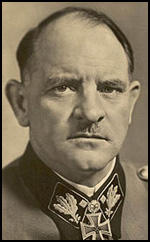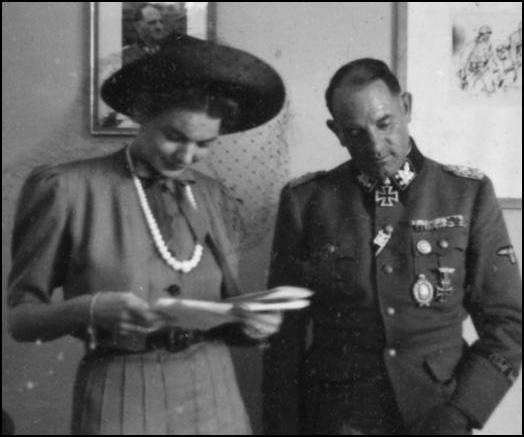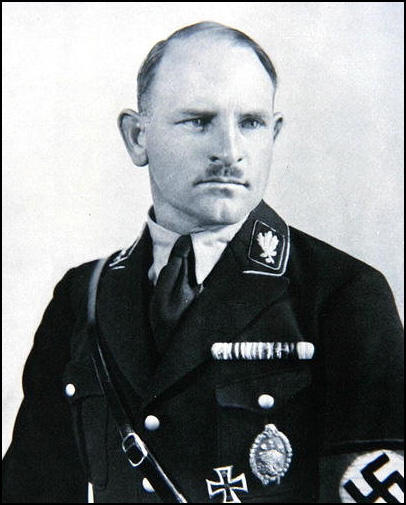Joseph (Sepp) Dietrich

Joseph (Sepp) Dietrich was born in Hawangen, Bavaria, on 28th May 1892. He joined the German Army in 1911 and during the First World War he was decorated for valor and was a crewman in one of Germany's first tanks.
After the war he worked as a butcher, farm labourer, waiter, policeman, foreman in a tobacco factory, customs officer, and gas station attendant. Dietrich was active in the Freikorps before joining the National Socialist German Workers Party (NSDAP).
Dietrich was selected by Adolf Hitler to become one of his personal bodyguards. Hitler nicknamed him "Chauffeureska" and he accompanied his leader on his automobile tours of Germany. Although he did not drive himself, Hitler had a passion for speed and Dietrich was ordered to drive the car very fast.
In 1928 Dietrich was appointed as commander of the Schutzstaffel (SS). William L. Shirer, who worked as a journalist in Nazi Germany, described Dietrich as "one of the most brutal men of the Third Reich". Dietrich himself admitted: "Human life matters little to the SS." At this time the SS had only 280 members. Hitler later commented: "Dietrich is a man who is simultaneously cunning, energetic and brutal. Under his swashbuckling appearance Dietrich is a serious, conscientious, scrupulous character." Dietrich was replaced by Heinrich Himmler in January 1929.
In 1930 Dietrich was elected to the Reichstag as a delegate for Wahlkries in Lower Bavaria. By 1931 he had attained the rank of SS-Gruppenfuehrer (Lieutenant General). After the Nazi Party gained power in 1933, Dietrich rose rapidly in the hierarchy of the party and was "detailed for special execution work" and William L. Shirer, who worked as a journalist in Nazi Germany, described Dietrich as "one of the most brutal men of the Third Reich". Dietrich himself admitted: "Human life matters little to the SS."
According to Albert Speer, the author of Inside the Third Reich (1970), Dietrich was a member of Hitler's inner-circle that included Joseph Goebbels, Herman Goering, Hermann Esser, Wilhelm Brückner, Julius Schaub, Heinrich Hoffmann, Julius Schreck, Franz Schwarz, Max Amann and Otto Dietrich: "Evenings he usually had some trusty companions about: Schreck, his chauffeur for many years; Sepp Dietrich, the commander of his SS bodyguard; Dr. Otto Dietrich, the press chief; Brückner and Schaub, his two adjutants; and Heinrich Hoffmann, his official photographer. Since the table held no more than ten persons, this group almost completely filled it. For the midday meal, on the other hand, Hitler's old Munich comrades foregathered, such as Amann, Schwarz and Esser... I saw very little of Himmler, Roehm or Streicher at these meals, but Goebbels and Goering were often there."
In June 1934 Adolf Hitler gave Dietrich a list of names that he wanted killed. "Go back to the barracks, select an officer and six men and have the leaders shot for high treason." The men protested their innocence. One cried out: "Sepp, my friend, what is happening? We are completely innocent! Dietrich replied: "You have been condemned to death by the Führer. Heil Hitler!" The men were then executed and were part of what became known as Night of the Long Knives.
On the outbreak of the Second World War Dietrich was given command of the 1st SS Panzer Division and took part in the invasion of France. He developed a reputation as a brave fighter and took part in Operation Barbarossa in June, 1941. On 9th October, Dietrich told Hitler that "For all military purposes, Soviet Russia is done with. The British dream of a two-front war is dead." Between Vyazma and Bryansk, another six hundred thousand Russians were trapped and taken prisoner."
Albert Speer argued that Dietrich ordered that Soviet prisoners should be killed: "In the course of advances by SS units it had been established, Dietrich said, that the Soviet troops had killed their German prisoners. Hitler had then and there announced that a thousandfold retaliation in blood must be taken... Hitler issued an order that this time no prisoners were to be taken." Speer explained to Hitler was this was a bad move: "I was alarmed at the sheer wastefulness of such a step. Hitler was counting on hundreds of thousands of prisoners. For months we had been trying in vain to close a gap of hundreds of thousands in the supply of labour."

In 1942 Adolf Hitler praised Dietrich's leadership qualities: "What care Dietrich takes of his troops! He'sa phenomenon in the class of people like Frundsberg, Ziethen and Seydlitz. He's a Bavarian Wrangel, someone irreplaceable. For the German people Sepp Dietrich is a national institution. For me personally there is the fact that he is one of my oldest companions in the struggle."
When the Allied forces landed in Normandy in June, 1944, Dietrich commanded three divisions of the 1st SS Panzer Corps. Louis L. Snyder has pointed out: "In December 1944, Hitler, still suspicious of most members of the High Command, gave Dietrich command of the Sixth Panzer Army in the belief that he could trust his own Waffen-SS troops. In a desperate gamble the Fueher committed his last reserves through the Ardennes to cut off the northern wing of the Allies from their supply base and wreck preparations for the coming Allied spring offensive. When Dietrich's army stalled, Hitler's offensive collapsed."

Sepp Dietrich was now transferred to the Eastern Front. In April 1945, dissatisfied with the performance of his troops, ordered Dietrich's men stripped of their armbands. Dietrich announced in the presence of other officers that he would return all his decorations or shoot himself: "Let's take a chamber pot, put all our medals into it, and around it tie the ribbon of Gotz von Berlichingen division." However, he did not kill himself and instead fled west and surrendered to the USA Army on 8th May, 1945.
In 1946 Dietrich was brought before an American military tribunal and accused, with forty-two other SS officers, of being responsible for the murder of seventy-one American prisoners of war near Malmedy on 17th December, 1944, at the height of the Battle of the Bulge. He was found guilty and sentenced to a prison term of twenty-five years. He was released after ten years but was then brought before a German court. On 14th May 1957, he was sentenced to nineteen months' imprisonment for his part in the Night of the Long Knives.
Joseph (Sepp) Dietrich died of a heart attack at Ludwigsburg on 21st April, 1966.
Primary Sources
(1) Joseph Goebbels, diary (2nd March, 1945)
I talked to Sepp Dietrich and he told me of the next assignment given him by the Führer. He hopes to be able to start the operations in Hungary, which have so often been mooted, in about six days' time. He reckons that these operations will last some 10 to 12 days. If all goes well we can anticipate enormous success. Then, he thinks, he will be available for further operations in east Germany in 14 days. So far we have successfully concealed 6 SS Panzer Army's concentration in Hungary from the enemy; at least no counter-measures by him have been reported for the moment. In general terms, therefore, we can count on major operations in the east German area being possible by the end of March. We have a long hard row to hoe till then, however.
Dietrich quite openly criticised measures taken by the Führer. He complains that the Führer does not give his military staff a sufficiently free hand and that this tendency has now become so pronounced that the Führer even lays down the employment of individual companies. But Dietrich is in no position to judge. The Führer cannot rely on his military advisers. They have so often deceived him and thrown dust in his eyes that he now has to attend to every detail. Thank God he does attend to them, for if he did not, matters would be even worse than they are anyway.
